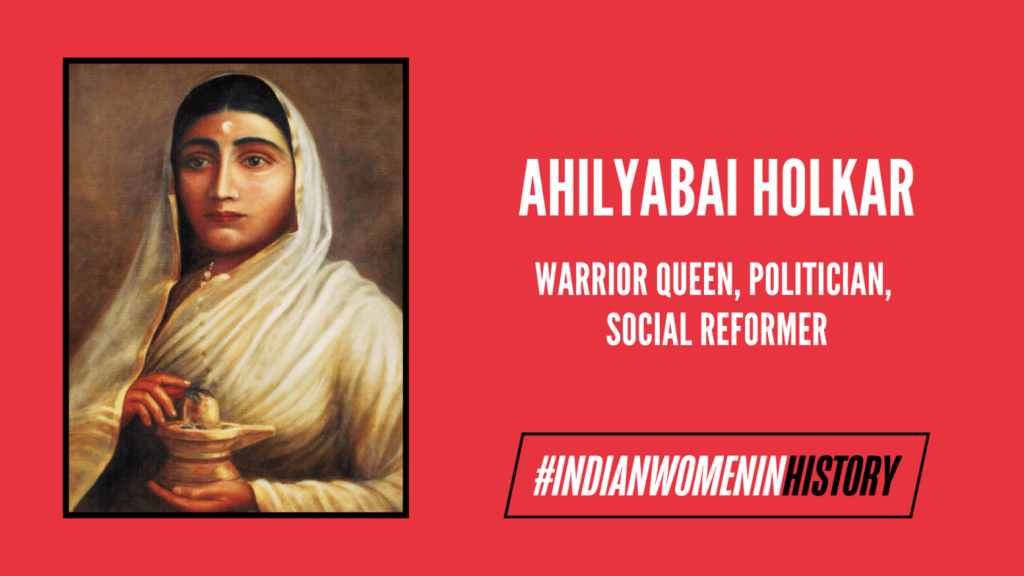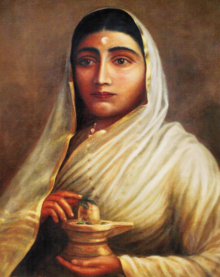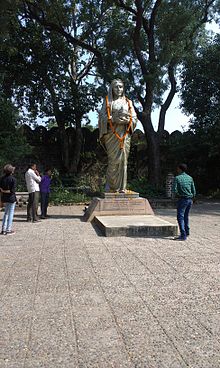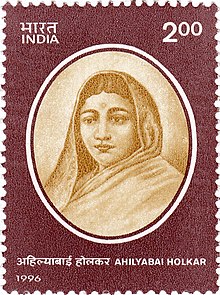Ahilyabai Holkar, Malwa’s benevolent, brave queen was an erudite politician and a champion of women’s education and empowerment.
Ahilyabai Holkar is a feminist figure who devoted her life to defeating patriarchal aggression and establishing women’s rights at a time when women were confined to the four walls of their houses. Ahilyabai was the hereditary noble Queen of the Maratha Empire, who created history by establishing an ideal leadership for her kingdom during her three-decade reign over Malwa.
During her reign, the region flourished and reached new heights. Not only was Holkar a prudent ruler, but also a bastion of women empowerment. She is fondly referred to as “Rajmata Ahilyabai Holkar”. “In latter days from Brahma came, To rule our land, a noble Dame, Kind was her heart, and bright her fame, And Ahlya was her honoured name,” writes Joanna Baillie.
Young Ahilyabai’s tryst with destiny
Ahilyabai Holkar was born on May 31, 1725, in the village of Chondi near Jamkhed, Ahmednagar, into an ordinary family of Indore. Despite the fact that women’s education was a far-fetched idea in the village, Ahilyabai’s father, Mankoji Rao Shinde home-schooled her to read and write. She had been a visionary since she was a child.
Despite the fact that Ahilyabai was not born into a royal family, her ascension to the throne was nothing short of a miracle. It was on his way to Pune that Malhar Rao Holkar, a renowned lord in the Malwa kingdom observed an eight-year-old Ahilyabai at a temple service feeding the hungry and needy. He decided to ask the young girl’s hand in marriage for his son Khanderao Holkar after being deeply moved by her deed of charity and strength of character. At the tender age of eight, Ahilyabai married Khanderao Holkar, in 1733.
The young bride’s happiness was short-lived as her husband was killed in the battle of Kumbher in 1754, leaving her a widow at the age of 29. Her father-in-law became her strongest pillar of support and forbade her from committing Sati.
The kingdom felt a strong vacuum after Malhar Rao also passed away, followed by her young son. Ahilyabai however, stood undeterred through all her personal losses. She decided to take matters into her own hands for the benefit of the kingdom’s administration and the lives of her people. She was enthrones and became the Queen of Indore on December 11, 1767.
The warrior Queen, erudite politician
While some in the kingdom objected to her accession to the throne, her army of Holkars stuck by her and supported her authority. Within a year of taking power, Malwa was encircled by invaders from all over as they presumed the kingdom had fallen into ‘lesser hands‘. However, the heroic Holkar queen, who was determined to safeguard her homeland, led her soldiers into battle, and drove out the enemy forces that had come to loot Malwa. She was a fearless warrior who was skilled in archery, sword fighting, and horseback riding.
She conquered the hearts of her people by slaying her adversaries and invaders on battlefronts with four bows and quivers of arrows attached to the corners of her favorite elephant’s howdah.
She went on to create a textile industry in the city as well. She introduced the tradition of the Maheshwari sarees. This flourishing handloom Maheshwari sari weaving industry has ironically been revived with an inversion in which women have taken to the loom and men are involved in the craft’s ancillary and external responsibilities
She was titled “The Philosopher Queen” by British historian John Keay. He said in her admiration: ‘Ahilyabai Holkar, the philosopher-queen of Malwa, had evidently been an acute observer of the wider political scene.’ Along with being a fierce queen and skilled ruler, Malwa’s Queen was also a learned politician. Even when the Maratha Peshwa had failed to understand the British and their objectives, she cautioned him against them.
In a letter written to the Peshwa in 1772, she said: ‘Other beasts, like tigers, can be killed by might or contrivance, but to kill a bear it is very difficult. It will die only if you kill it straight in the face, or else, once caught in its powerful hold; the bear will kill its prey by tickling. Such is the way of the English. And given this, it is difficult to triumph over them.’
Philanthropist, benevolent ruler
Ahilyabai is known for constructing multiple forts and roads in Malwa, as well as for supporting festivals and donating to numerous Hindu temples. Ahilyabai is famous for rebuilding Varanasi’s Kashi Vishwanath Temple. According to the Bharatiya Sanskritikosh, the Holkar queen renovated and beautified several locations like Gaya, Somnath, Ayodhya, Mathura, Haridwar, Kanchi, Avanti, Dwarka, Badrinarayan, Rameshwar, and Jaganathpuri.
Her benevolence was reflected in the construction of hundreds of temples, ghats, wells, tanks, and rest-houses that stretched from the Himalayas in the north to pilgrimage centers in the south. “Indore long mourned its noble Queen, happy had been her reign, and her memory is cherished with deep reverence unto this day,” wrote Annie Besant.
Ahilyabai Holkar was a woman ahead of her time. She was an outspoken supporter of women’s rights. She was a well-read and pioneered women’s education at a period when it was forbidden. Due to invasions in the 18th century, women in India were unable to learn as they had in the past. Ahilyabai Holkar became a role model for all women, inspiring them to reintroduce the concept of female education
Rajmata Ahilyabai was a people’s ruler who was loving and sympathetic. She used to hold daily public meetings to address the grievances of her people. She declared that she was ready to aid anyone who needed help. She permitted the Bhil tribes, who had been tormented for years, to peacefully conduct farming.
Historians record how she encouraged everyone in her realm and kingdom to be the best they could be. During her reign, merchants manufactured their most elegant garments, and trade expanded at an unprecedented rate. The farmers were no longer victims of exploitation, but self-sufficient individuals.
Maheshwar, her capital, was a tapestry of literary, musical, artistic, and industrial achievements. The artisans, sculptors, and artists were well compensated for their talents and held in great regard by the Queen. She welcomed intellectuals such as Marathi poet Moropant, Shahir Anantaphandi, and Sanskrit scholar Khushali Ram into her city.
She went on to create a textile industry in the city as well. She introduced the tradition of the Maheshwari sarees. This flourishing handloom Maheshwari sari weaving industry has ironically been revived with an inversion in which women have taken to the loom and men are involved in the craft’s ancillary and external responsibilities.

Social reformer and educationist
Ahilyabai Holkar was a woman ahead of her time. She was an outspoken supporter of women’s rights. She was a well-read and pioneered women’s education at a period when it was forbidden. Due to invasions in the 18th century, women in India were unable to learn as they had in the past. Ahilyabai Holkar became a role model for all women, inspiring them to reintroduce the concept of female education.
She was also against the inhumane and discriminatory practice of Sati Pratha. She strived to stop sati which was largely prevalent in north India. Very few women of her time dared to defy this centuries old tradition, but she never shied away from standing up for what was right.
India’s history is filled with wonderful instances of women who led the country via their courage, charisma, foresight, and most importantly, their strength of character. But, Ahilyabai Holkar, Malwa’s benevolent and brave queen, will always stand out among others.
Article Credits: FII



